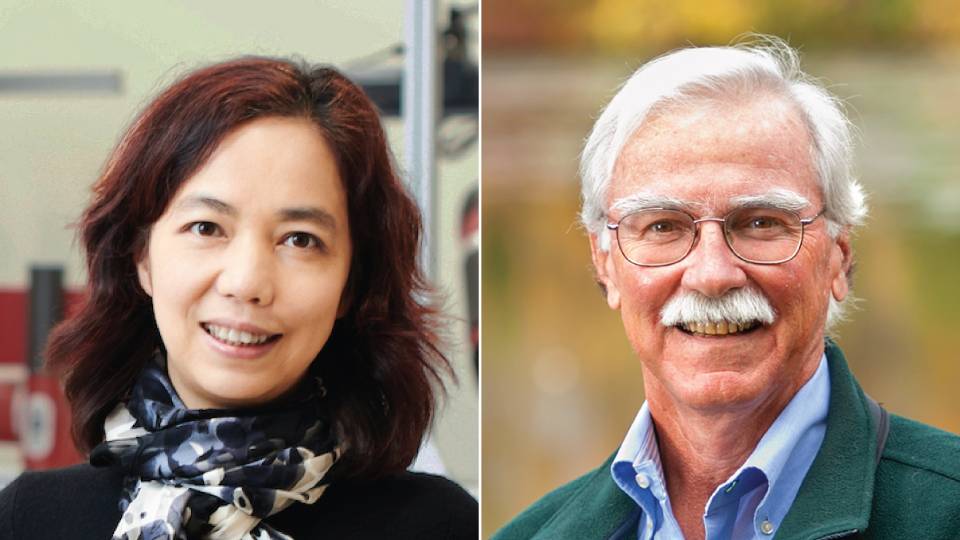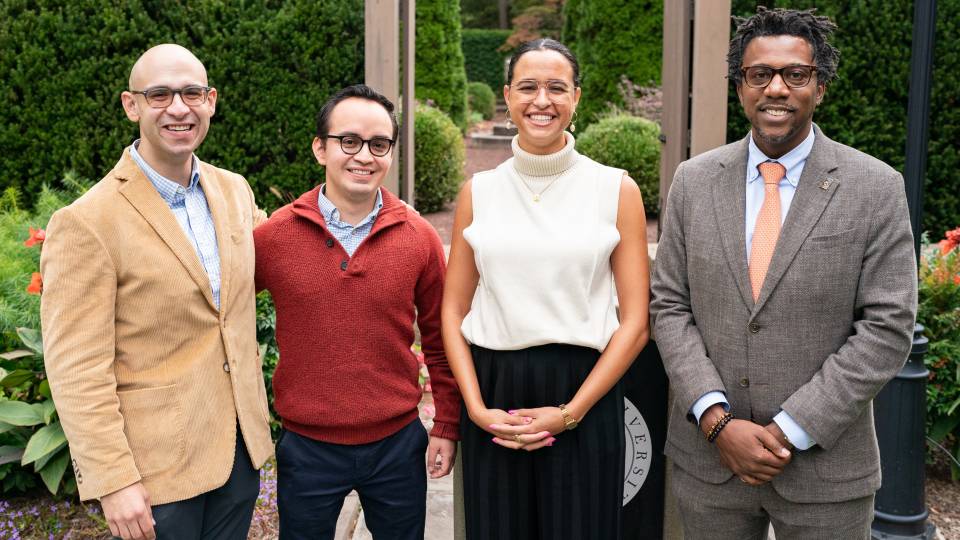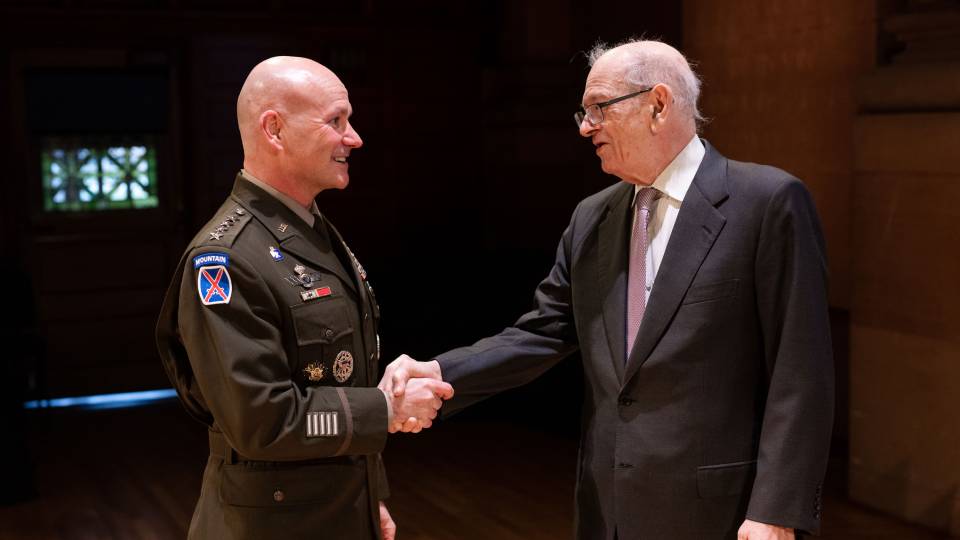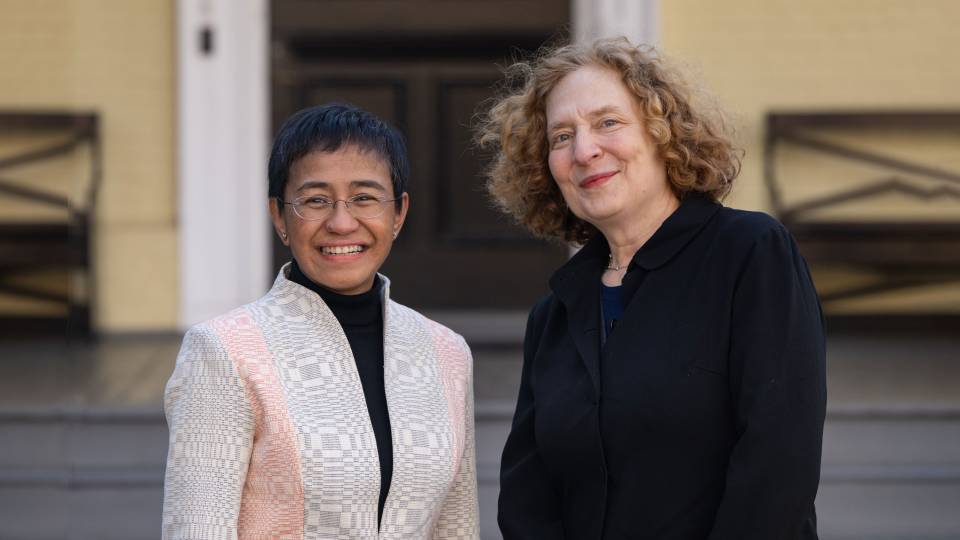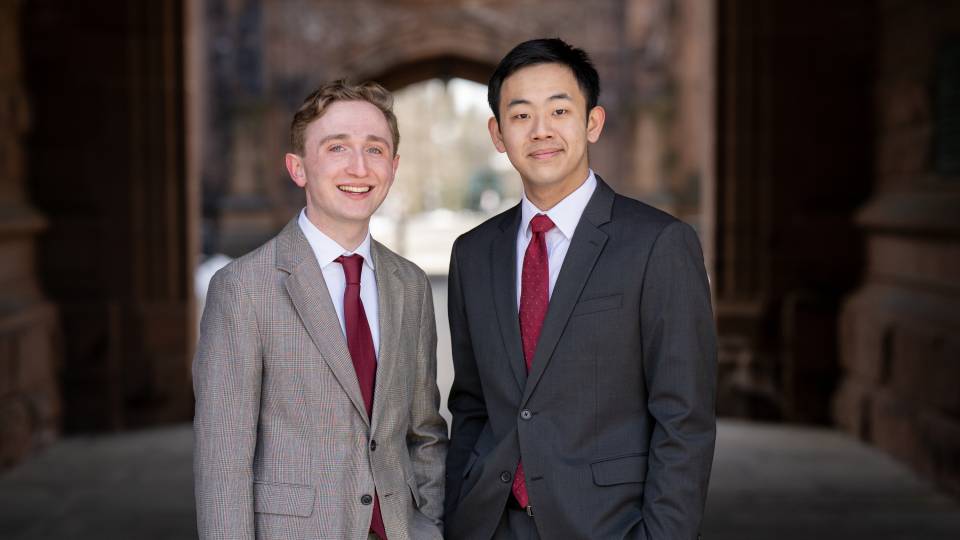More than 1,000 alumni, faculty, staff, students and guests attended Princeton’s Alumni Day program on Saturday, Feb. 24.
Princeton gave top alumni honors(Link is external) to AI visionary Fei-Fei Li and renowned ornithologist John Fitzpatrick on Saturday, Feb. 24, during an Alumni Day(Link is external) program that demonstrated the impact of Princeton’s “audacious bets” on talent and potential.
Li, Class of 1999, is a Stanford University computer scientist at the forefront of human-centered artificial intelligence research. She received the Woodrow Wilson Award, which honors commitment to service and humanity.
Fitzpatrick, who earned his Ph.D. in biology in 1978, was given the James Madison Medal in recognition of his distinguished career as a leading ornithologist dedicated to the conservation of birds around the world.
More than 1,000 alumni, faculty, staff, students and guests attended the annual mid-winter gathering on campus. The 109th Alumni Day also included top prizes for undergraduate and graduate students, the annual Service of Remembrance memorial ceremony and smaller alumni gatherings around campus. A compilation of videos and remarks from the day is available on the Princeton Alumni website(Link is external).
Li receives Wilson Award

Louise “Weezie” Sams (right), Class of 1979 and chair of the Board of Trustees, presents Fei-Fei Li (left), Class of 1999, with the Woodrow Wilson Award during Alumni Day. The award recognizes contributions to service and humanity.
“Dr. Li exemplifies Princeton’s value of service to humanity,” Dean of the College Jill Dolan said in her introduction during the morning awards ceremony in Richardson Auditorium. “In the rapidly exploding field of artificial intelligence, which many people view with rather existential concern, Dr. Li opts for a more measured and humanistic view.”
Li is the Sequoia Capital Professor in Computer Science at Stanford and co-director of Stanford’s Human-Centered Artificial Intelligence Institute. Named to last year’s TIME100 list of the most influential people in AI, Li is committed to using technology in a way that preserves human dignity.
She is also the co-founder of AI4All, which introduces artificial intelligence to high school students who have diverse perspectives and experiences, with the goal of unlocking the technology’s human benefits.
In her Alumni Day lecture, “What We See and What We Value: AI with a Human Perspective,”(Link is external) Li advocated for a human-centered approach to artificial intelligence.
“AI should never be replacing people, especially our dignity, our compassion, our love, our self-respect, but AI is a great tool to augment people and to enhance our capabilities,” Li said.
“Artificial intelligence is made by humans and is deployed by humans,” she added. “It should be used for humans and should be governed by humans.”
Li has testified before Congress on the issues related to AI, and has worked with local and national leaders on policies regarding the responsible use of technology. In her lecture, she spoke about her work developing AI tools to improve healthcare.
Li also shared how much Princeton means to her. “Just like all of you, I also personally owe everything to Princeton,” she told fellow alumni.
She recalled visiting campus for the first time while in high school, shortly after her family emigrated from China to New Jersey. “I was a nerdy teenager working in a Chinese restaurant during the day and dreaming of special relativity at night,” she joked.
Li went on to earn her bachelor’s degree in physics from the University and also spent time on the faculty. While teaching at Princeton in 2009, she co-developed the project ImageNet, a visual database that was instrumental in the development of computer vision.
“Princeton has become a home to me in so many ways,” Li said. “It’s a home of where my intellectual journey began. … It’s also a spiritual home where every day I try to live up to Princeton’s teaching of being in the nation’s service and the service of all nations.”
Many of the themes Li discussed at Alumni Day are included in her memoir “The Worlds I See: Curiosity, Exploration, and Discovery at the Dawn of AI.” The book was recently selected as the Princeton Pre-read for the incoming Class of 2028.
Fitzpatrick wins Madison Medal

Sams (right) presents the James Madison Medal to John Fitzpatrick (left), who earned his Ph.D. in biology in 1978. The medal recognizes a distinguished career, contributions to graduate education or public service.
Fitzpatrick, who has been called “North America’s most prominent ornithologist,” has devoted his life to studying and saving birds. His Alumni Day remarks, “Wild Birds Are Canaries, and Our Planet is the Coal Mine,”(Link is external) demonstrated how birds are essential to our ecosystem and serve as harbingers of its future.
“We are at the opening of what will become a global opportunity to look at very fine details of how bird populations are doing and measuring what they’re telling us about their local situations — some good, some worrisome, some downright catastrophic,” Fitzpatrick said.
From 1995 to 2021, Fitzpatrick was director of the renowned Cornell Laboratory of Ornithology. At Cornell, he oversaw the creation of eBird, a global bird-observation website that documents and tracks more than 100 million bird sightings annually. He continues to work on the ecology and conservation of the endangered Florida scrub-jay.
“The James Madison Medal award is bestowed upon a Graduate School alumnus who has led a distinguished career, advanced the cause of graduate education, or achieved an outstanding record of public service,” Dean of the Graduate School Rodney Priestley said in his introduction. “This year’s honoree has soared in all three areas.”
Fitzpatrick, who noted he was the first biologist to receive the Madison Medal, said he has loved birds since he was a young boy growing up in rural Minnesota.
“Why birds?” he asked rhetorically. “Birds have enormous power.”
Birds are models for how nature works, birds are extremely sensitive to environmental indicators, birds’ migration patterns represent the “heartbeat of earth’s annual cycles,” and birds connect humans to nature, Fitzpatrick explained.
Through decades of research, Fitzpatrick and colleagues have observed significant declines in many avian populations throughout North America. Data collected through eBird, which he called “the world’s largest citizen science project,” has been essential to his field, as have artificial intelligence tools that help researchers analyze avian population trends.
“We now have this relationship with birds, aided by the technology of computation, that gives us the chance that we can actually learn how humans fit in with all this grandeur,” Fitzpatrick said.
While each species has “its own story,” Fitzpatrick noted various reasons for avian declines, such as habitat loss and a decline in the group of insects that birds eat. He said light pollution from large city centers disrupt migration patterns across the country, but public awareness campaigns like “Lights Out Texas” have shown that humans can change their behaviors to help birds.
We all can play a role in protecting birds and their habitats, Fitzpatrick said, such as not using pesticides on gardens and lawns and supporting local land trusts.
“Remember the powers that birds bring us and that every one of you can be contributing to understanding, in more detail than we’ve ever been able to, how we interact with natural places around the world,” he told the audience.
Student awards, Service of Remembrance, smaller alumni gatherings
The alumni awards ceremony in Richardson Auditorium also included the recognition of the recipients of Porter Ogden Jacobus Fellowship, Princeton’s top honor for graduate students, and the winners of the Moses Taylor Pyne Honor Prize, the highest general distinction conferred on undergraduate students.
“Today I have the honor of recognizing several students who demonstrate what is possible when we make audacious bets on human talent,” President Christopher L. Eisgruber said. “This year’s honorees have demonstrated remarkable talent, tremendous dedication and exceptional promise.”
The Jacobus Fellowship was awarded to graduate students José de Jesús Montaño López, a sixth-year doctoral student in the Department of Chemical and Biological Engineering; Geneva Smith, a sixth-year doctoral student in history; Pasquale Toscano, a fifth-year doctoral student in English; and Ryan Unger, a fifth-year doctoral student in mathematics. A video featuring the Jacobus Fellows and their research(Link is external) is online on the Alumni website.
The Pyne Prize was given to Class of 2024 members Casey Beidel and Brian Sheng-Kai Li. Beidel is a sociology major from Rutherford, New Jersey, pursuing certificates in American studies, music theater, and gender and sexuality studies. Li, of Basking Ridge, New Jersey, is majoring in comparative literature and pursuing a certificate in global health and health policy. Their Pyne Prize remarks(Link is external) are online on the Alumni website.
After the awards ceremony, alumni and guests attended the annual Alumni Association luncheon at Jadwin Gymnasium. The lunch was followed by the Service of Remembrance(Link is external) at the Princeton Chapel, honoring alumni, students, and members of the Princeton University faculty and staff whose deaths were recorded by the University in 2023.
Alumni Day was also a chance for other opportunities for alumni connections, such as the return of the “Reaching Across Generations” program, which is open to all and aims to connect Black Princeton alumni, students, faculty and staff. Other gatherings included receptions hosted by other affinity groups, also open to all, including the Asian American Alumni Association, Association of Latino Princeton Alumni, Association of Princeton Graduate Alumni, Native Alumni of Princeton and Queer Princeton Alumni. The closing Alumni Day reception included a toast to the 20th anniversary of the Princeton Prize in Race Relations(Link is external).
Many alumni will return for Reunions(Link is external) 2024, scheduled for May 23-26.







